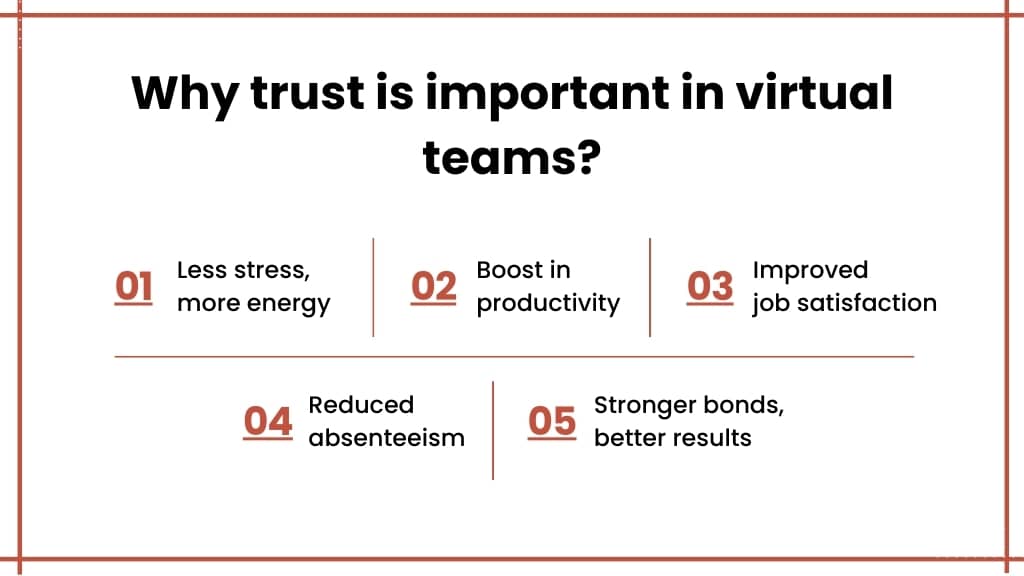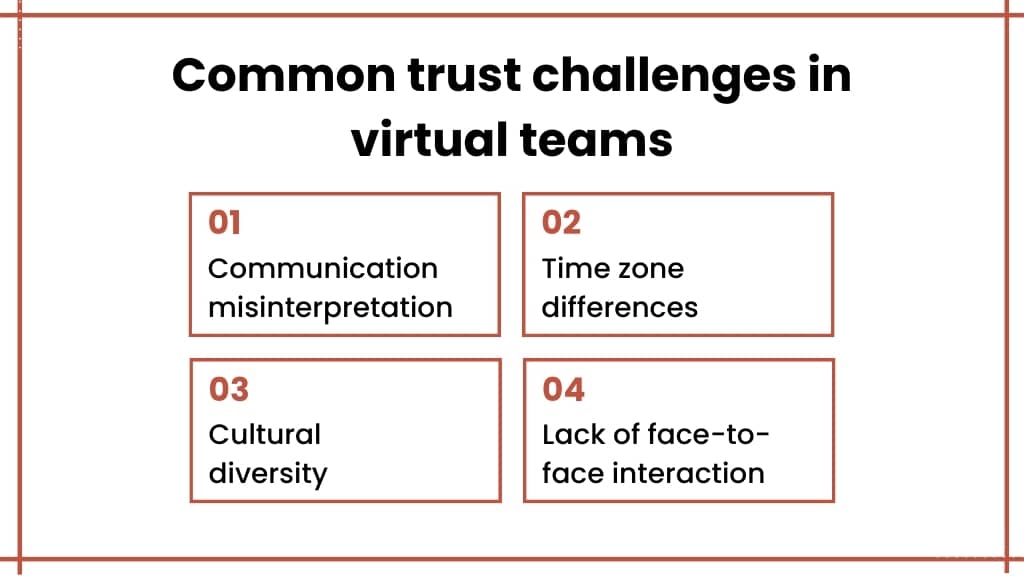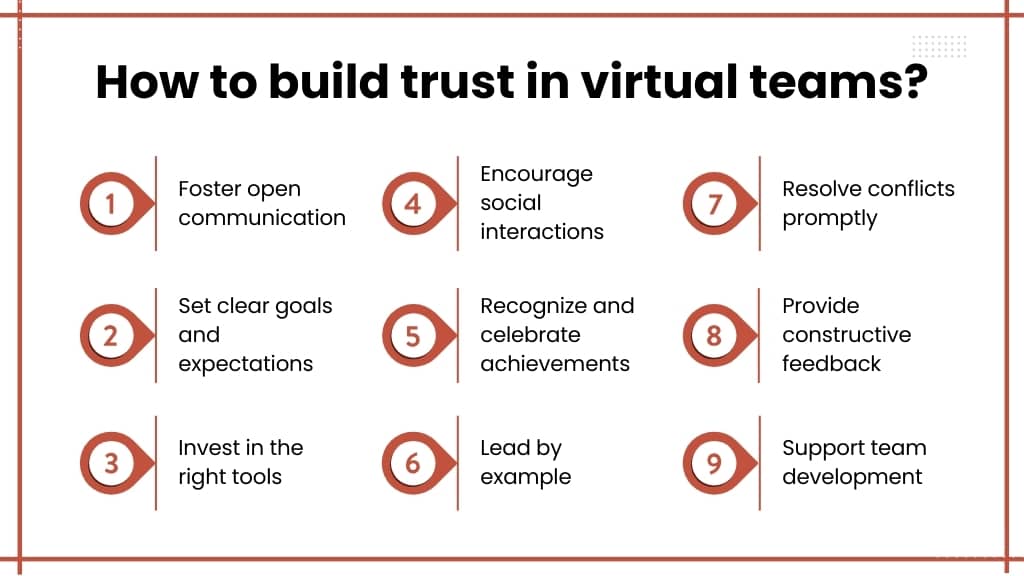Introduction
Why is building trust in virtual teams necessary?
Well, increased productivity, enhanced engagement, and better problem-solving are just a few of the benefits.
Yet, managing remote teams feels like a constant struggle. Without face-to-face interaction, miscommunication and misunderstandings can easily happen, affecting trust and collaboration.
If you are looking for ways to build trust among your team members, you’re in the right place.
In this article, you will learn about best practices to build trust in your virtual teams. So that your team remains cohesive and productive, no matter the distance.
Why trust is important in virtual teams?
When trust is present, it creates a work environment where team members feel supported, valued, and respected. Trust helps you build a positive and productive atmosphere that is essential for the success of virtual teams.
Here are some key reasons why trust is crucial in virtual teams:

- Less stress, more energy
Imagine working in an environment where you trust your team members completely. No constant second-guessing or worrying if someone is pulling their weight.
High-trust teams experience less work stress because they don’t have to deal with doubts and suspicions.
And, guess what?
Less stress means more energy!
Instead of wasting time and effort on conflicts and micromanagement, you can channel that energy into your work, feeling engaged and ready to tackle challenges.
- Boost in productivity
Trust is the fuel for productivity.
When your team members trust you, they don’t slow you down with unnecessary oversight or doubt your abilities. This creates a smoother workflow where everyone can focus on their tasks without interruptions.
Plus, the atmosphere of trust fosters collaboration and open communication, making it easier to work together and get things done efficiently.
- Improved well-being and job satisfaction
Ever heard the phrase, “Happy employees, happy company”?
It’s true!
Workers in high-trust environments are not only more satisfied with their jobs but also with their lives overall.
When you feel supported and valued by your team, it’s easier to find fulfillment in your work. And that satisfaction ripples out into other areas of your life, contributing to a better overall outlook.
- Reduced absenteeism
Stress can take a toll on your health. You take more sick days, which leads to less productivity.
But in high-trust teams, where stress levels are lower, you and your team members tend to take fewer sick days.
This isn’t just good for your team’s productivity; it also promotes a positive work environment where people feel comfortable and supported.
Read more – How to create a positive work environment?
- Stronger bonds, better results
In virtual teams, trust holds everyone and everything together.
Without the benefit of physical presence, you have to rely on real connections and a shared belief that everyone will deliver on their commitments.
When trust is strong, it sets the stage for better collaboration, communication, and ultimately, better results.
Common trust challenges in virtual teams
There are unique challenges that you can face while building trust in your virtual teams. Here are some of the most common ones:

- Communication misinterpretation
According to Albert Mehrabian’s 7-38-55 Communication model, 55% of communication is body language, and 38% is tone of voice.
But when you and your team are working from home, you can’t see each other’s body language or hear their tone of voice. It’s easy for messages to get mixed up. You can misunderstand each other.
To avoid this, use clear and simple language. Always check if everyone understands by asking follow-up questions or summarizing what’s been said. This will help you ensure everyone is on the same page and build trust in your virtual team.
- Time zone differences
If you are working in a virtual team, it can be a real headache to deal with time zone differences. It’s hard to coordinate schedules and communicate when everyone is in a different time zone.
This can make it tough to build trust among team members, as delayed decisions and project progress make everyone feel disconnected and undervalued.
You can implement flexible working hours and time zone management tools to keep everyone on track, regardless of their location. This will help you create a more efficient and effective work environment.
- Cultural diversity
Cultural diversity brings different communication styles and expectations to your team. Due to varying cultural backgrounds, team members may interpret communication differently, and this can lead to misunderstandings.
To overcome this, try to build an inclusive environment by promoting cultural awareness and sensitivity training.
By doing so, you can create an environment where everyone can learn from each other’s differences. This leads to better understanding, trust, and collaboration within the virtual team.
- Lack of face-to-face interaction
When you’re working with a virtual team, it’s tough to create personal connections without face-to-face interaction, and that’s really important for building trust.
To bridge this gap, schedule regular video calls and organize virtual team-building activities. This will help you simulate face-to-face interaction. So that you and your team members can connect on a personal level.
A friendly video chat can make a big difference in helping your virtual team feel connected and trusted.
How to build trust in virtual teams?
Building trust in virtual teams can be a challenge, but with the right strategies, you can create a strong and cohesive team dynamic. Here are some best practices to help you build trust in your virtual team:

1. Foster open communication
The first thing you can do to build trust among your team members is encouraging open communication among your team. When team members feel comfortable sharing their ideas and concerns, it creates an supportive environment of open dialogue.
Regular check-ins and open forums facilitate honest conversations, leading to better collaboration and trust. In virtual teams, building trust can be challenging because of the lack of face-to-face interaction.
Therefore, creating a comfortable space for open dialogue becomes even more important in virtual teams to ensure trust and collaboration.
Read more- Unlock a safer and more supportive work environment with these actionable tips
2. Set clear goals and expectations
When your team members know exactly what they’re supposed to do and what’s expected of them, it creates a sense of clarity and direction.
Clear goals guide your team members toward the same destination. This is especially essential in virtual teams, where communication can be a challenge.
According to Quantum work report, employees are 2.8 times more likely to be highly engaged when their employers set clear goals and expectations for them.
When everyone is on the same page and working towards the same goals, it build trust and accountability within the team.
3. Invest in the right tools
By using reliable communication, collaboration, and project management tools, you can streamline interactions and boost overall productivity.
In fact, 46% of employees feel as though digital tools make them more productive.
However, you need to choose the right one. When team members have access to the right tools, they can communicate seamlessly, collaborate efficiently, and manage projects effectively. You can use a project management tool like ProofHub.
ProofHub is a well-known tool popular for its compressive set of features that lets you manage your projects and collaborate with your virtual team – all in one place. Its centralized platform allows you and your team members to have a clear overview of project progress, deadlines, and individual responsibilities. This transparency helps you build trust among virtual teams.
4. Encourage social interactions
When team members get to know each other on a personal level, they have strong relationships.
Trust among virtual team members is significantly higher when team members have frequent informal communication.
You need to organize virtual bonding activities, so that, your team members can interact with each other. These activities can include virtual coffee breaks, team-building activities, and casual chats.
These interactions create a sense of unity within the team, even though they are not physically together.
5. Recognize and celebrate achievements
Acknowledge both individual and team accomplishments, whether it is big or small. By doing so, you can boost the morale of your team and reinforce a sense of collective success.
When everyone feels appreciated, it builds a positive and trusting environment. So, celebrating achievements not only boosts morale but also increases commitment.
You can celebrate accomplishments with your team members by praising and thanking them for their hard work and contributions. You can do this through personalized messages, public shout-outs in team meetings, or even organizing team lunches.
6. Lead by example
When you lead by example, you’re setting the standard for your team. It’s all about modeling the behavior you’d like to see in others. People are influenced by the actions of those around them. Your behavior sets the tone for the whole team.
So, if you want your team to be honest, dependable, and open, you need to show these qualities yourself.
You need to be a role model. Your actions speak louder than your words, and they can inspire others to follow suit.
7. Resolve conflicts promptly
As a manager, you need to resolve conflicts among your team members to keep the peace and harmony in a team. Unresolved conflicts can lead to decreased productivity and morale.
When issues pop up, it’s best to address them right away in a fair and understanding manner. This will help you prevent little disagreements from turning into bigger problems, and it keeps the team environment positive and productive.
If you take swift action to manage conflicts, it shows that you value your team and their well-being.
Read more – 7 biggest causes of workplace conflict (and How to resolve them)
8. Provide constructive feedback
Constructive feedback lets your team members grow. So, encourage an open feedback environment where everyone feels comfortable sharing and receiving input.
When you are giving feedback to your team members, be specific and focus on behaviors, not personalities. For example, instead of saying “You’re not a good communicator,” you can try “I noticed that during the meeting, you interrupted others a few times.”
This approach makes feedback less personal and more constructive. Feedback is a two-way street, so you need to be open to receiving it as well.
9. Support team development
You need to support your team’s development and offer opportunities for learning and skill-building. This investment shows that you’re committed to their success and helps build trusting long-term relationships.
You can organize workshops, training sessions, or mentorship programs to help your team members grow in their roles.
By providing development opportunities, you can boost your team’s skills, leading to the overall success of your organization.
Conclusion
In a nutshell, building trust in virtual teams is essential for creating a positive and successful remote work environment. By following the above best practices, you and your team can overcome the challenges of distance and build a strong foundation of trust.
When there’s trust in your virtual team, you’ll all communicate better, work together more effectively, and get more done.
For more such useful information, keep reading-
- Top 5 inclusive leadership skills for a thriving workplace
- 8 Habits to keep your remote team engaged in 2024
- 9 Challenges of hybrid working and how you should tackle them
FAQs
What are the two types of trust in teams?
There are two main types of trust in teams: cognitive trust and affective trust.
- Cognitive trust is based on your belief in someone’s skills, reliability, and professionalism. It’s the kind of trust you have when you know a team member will deliver high-quality work on time.
Affective trust, on the other hand, is more emotional. It’s the trust you build through personal connections, empathy, and genuine care for each other. Both types are important for a strong, cohesive team.
What are the three foundations of trust in teams?
The three foundations of trust in teams are authenticity, logic, and empathy.
- Authenticity means being genuine and true to yourself. When you’re authentic, people feel they can trust what you say and do.
- Logic involves being rational and clear in your decisions. When your actions and decisions make sense, it’s easier for others to trust you.
- Empathy is about understanding and caring for others’ feelings. Showing empathy helps build a strong connection and trust within the team.
What are the 3 C's of trust?
The 3 C’s of trust are competence, character, and caring.
- Competence means you have the skills and knowledge to do your job well. When people see you’re competent, they trust you to get things done.
- Character is about having integrity and being honest. If you show good character, people know they can rely on you.
- Caring is showing that you genuinely care about others. When you care, people feel valued and are more likely to trust you.
What is the formula for trust in virtual teams?
Building trust in virtual teams can be summed up with a simple formula:
Trust = Communication + Reliability + Consistency
- Communication is the foundation. Regular and open communication helps everyone stay connected and informed.
- Reliability means doing what you say you’ll do. When you’re reliable, people know they can count on you.
- Consistency is about being dependable in your actions and decisions. Consistency helps create a stable and trustworthy environment.




























No Comments